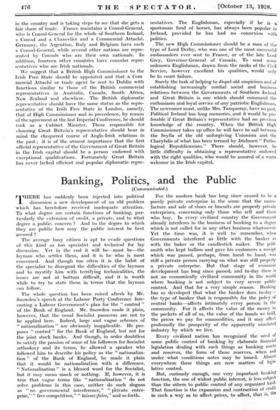Great Britain's Diplomatic Representation in Southern Ireland
THE existing means of diplomatic intercourse between Great Britain and the Irish Free State leaves much to be desired. Now that the British Government has appointed a High Commissioner to Canada, it is to be hoped that a similar appointment will be made in the Irish Free State without delay.
Owing to our lack of representation in Dublin, Great Britain is sevevely handicapped in her intercourse with the Irish Free State compared with other nations, for, while the Governor7General is the representative of the British Crown, he can in no sense be regarded as the representative of the Government of Great Britain in practical affairs. The present unsatisfactory position is due to the fact that we have not yet adapted all the machinery of Empire to the decisions of the last Imperial Conference, when the status of the component parts of the British Commonwealth was clearly defined and equality of status of the self-governing Dominions and the Mother Country was acknowledged once for all. Diplomatically, if not commercially, the direct repre- sentation of Great Britain in Southern Ireland is quite as important as British representation in the Dominion of Canada. Englishmen who have not been in Ireland since the signing of the Anglo-Irish Treaty seven years ago may not be aware that Dublin has become a diplo- matic centre of considerable importance, and other nations have not been slow to send capable officials and well-trained diplomats. One of the most popular of the foreign representatives in Dublin is undoubtedly Mr. Sterling, the United States Minister. Mr. Sterling was able to draw on the fount of pro-American feeling which has always existed in Southern Ireland, and his engaging personality, his grasp of the complexities of Irish life and his fondness for sport have all been factors in making for him a special position of influence. The United States also maintains a Consul-General in Dublin, four Vice-Consuls and a considerable staff, so it will be seen that America is fully alive to the commercial possibilities in the country and is taking steps to see that she gets a fair share of trade. France maintains a Consul-General, who is Consul-General for the whole of Southern Ireland, a Consul and a Chancelier and a Commercial Attache. Germany, the Argentine, Italy and Belgium have each a Consul-General, while several other nations are repre- sented by Consuls who are their own nationals. In addition, fourteen other countries have consular repre- sentatives who are Irish nationals.
We suggest that a British High Commissioner to the Irish Free State should be appointed and that a Corn mercial Attache or trade agent be sent to Dublin with functions similar to those of the British commercial representatives in Australia, Canada, South Africa, New Zealand and elsewhere. The British diplomatic representative should have the same status as the repre- sentative of the Ira Free State in London, namely, that of High Commissioner and in precedence, by reason of the agreement at the last Imperial Conference, he should rank as a Cabinet Minister. Those responsible for choosing Great Britain's representative should bear in mind the chequered course of Anglo-Irish relations in the past ; it is of the utmost importance that the first official representative of the Government of Great Britain in the Irish capital should be a person endowed with exceptional qualifications. Fortunately Great Britain has never lacked efficient and popular diplomatic repre- sentatives. The Englishman, especially if he is a sportsman fond of horses, has always been popular in Ireland, provided he has had no connexion with politics. • The new High Commissioner should be a man of the type of Lord Derby, who was one of the most successful ambassadors ever sent to France, or of the late Lord Grey, Governor-General of Canada. To .send some unknown Englishman, drawn from the ranks of the Civil Service, however excellent his qualities, would only be to court failure.
Surely the task of helping to dispel old suspicions and of establishing increasingly cordial social and business relations between the Governments of Southern Ireland and Great Britain is one which should command the enthusiasm and loyal service of any patriotic Englishman. The newcomer must, unlike Mrs. Tanqueray, have no past. Political Ireland has long memories, and it would be pre- ferable if Great Britain's representative had no previous knowledge of the country. When the British High Commissioner takes up office he will have to sail between the Scylla of the old unforgiving Unionism and the Charybdis of what has been termed by Irishmen " Patho- logical Republicanism." There should, however, be little difficulty in obtaining a representative endowed with the right qualities, who would be assured of a warm welcome in the Irish capital.









































 Previous page
Previous page